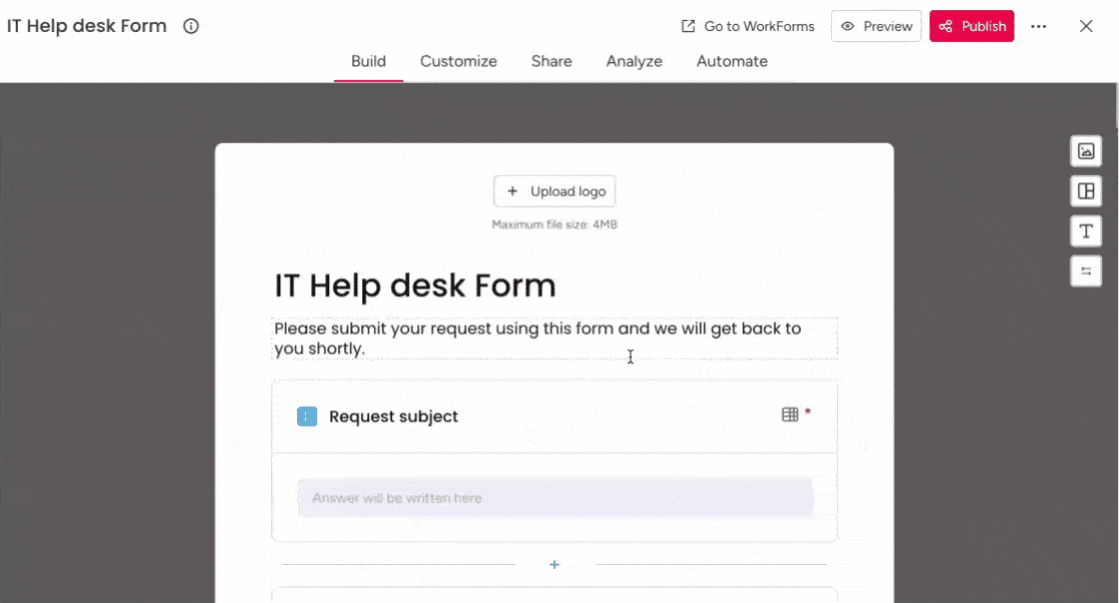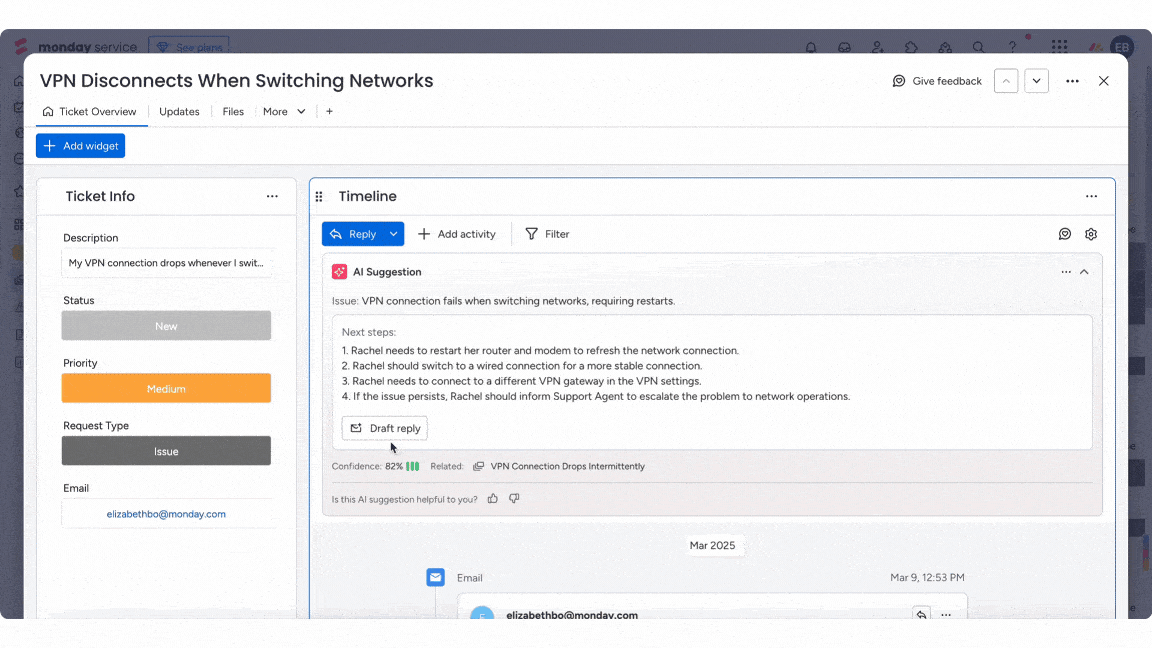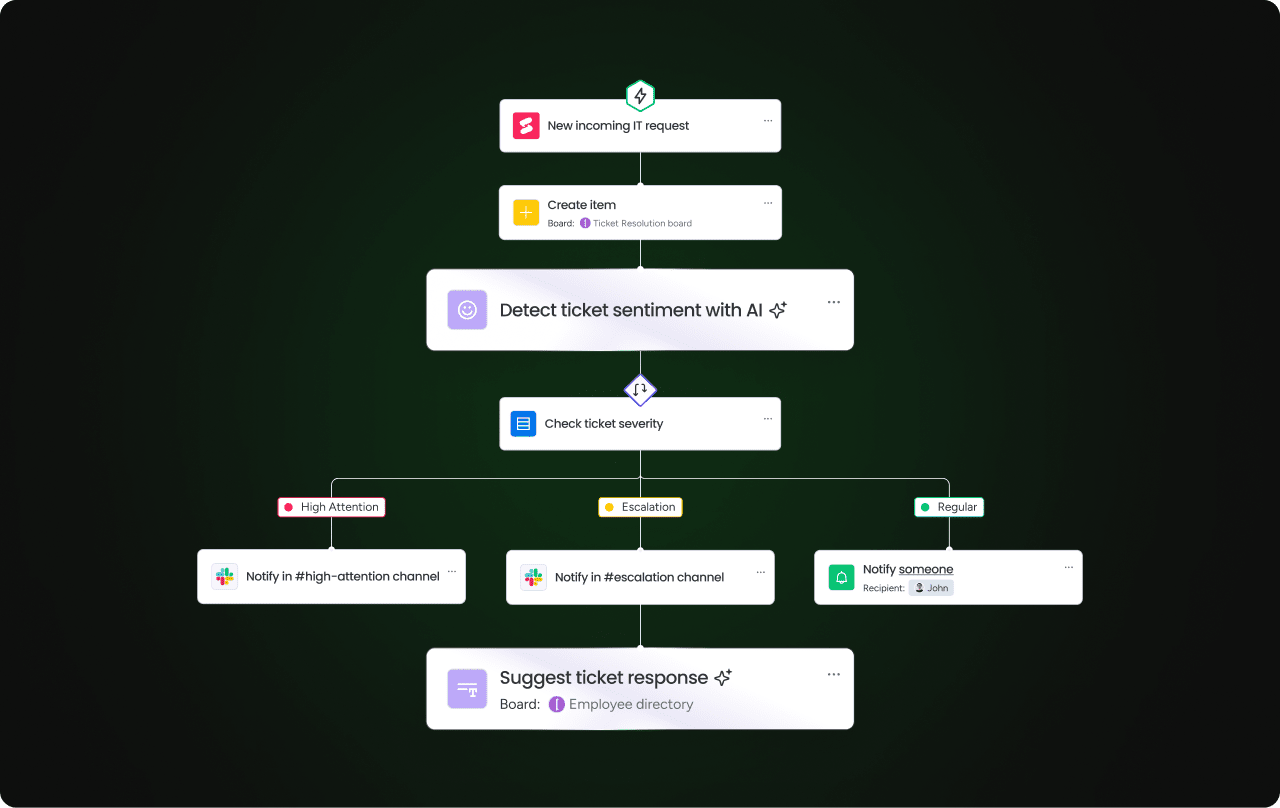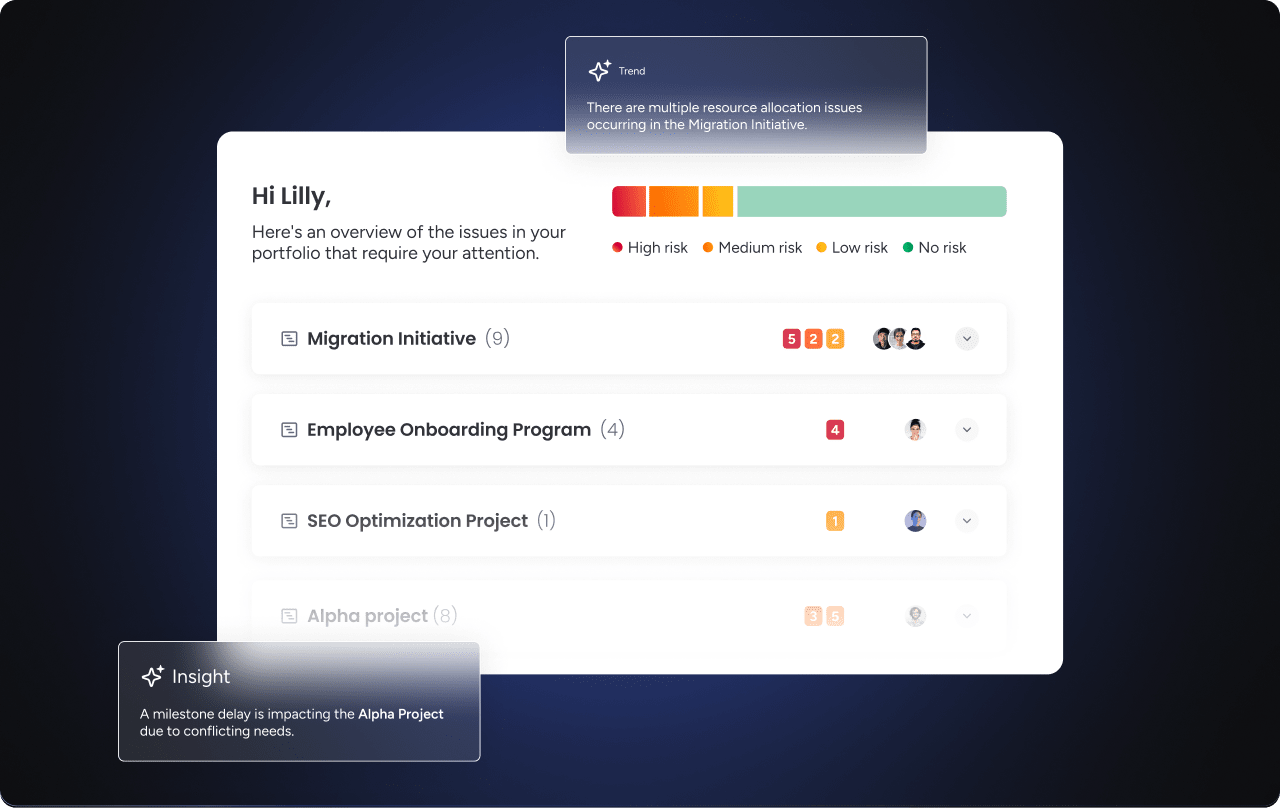IT service management is ripe for an overhaul. Traditionally weighed down by spreadsheets, email chains, and event logs, IT professionals spend far too much time combing through files and manually updating cases. The result? Delays, errors, and missed opportunities to improve service quality and respond proactively to risk.
Artificial intelligence offers a powerful alternative that brings the speed, scalability, and precision ITSM has long needed. This guide breaks down AI for ITSM, including its technologies, the real benefits (and limitations) of using it, and how monday service helps teams adopt intelligent service operations.
Try monday serviceKey takeaways
- AI is transforming ITSM from reactive support to proactive service. By identifying risks, automating tasks, and improving response times, AI unlocks a more strategic approach to service management.
- Cost savings, speed, and resource optimization all drive adoption in AI.
- Challenges like governance and trust still stand in the way. Many teams face barriers around compliance, data sensitivity, and confidence in AI decisions, making adoption a thoughtful process.
- AI’s impact goes beyond ticket management and IT help desk support. From anomaly detection to change impact analysis, AI powers smarter operations across the entire business.
- With AI Blocks, smart automations, and a no-code interface, monday service takes teams from AI-friendly to AI-first, without complexity.
What is AI for ITSM?
AI for ITSM uses intelligent technologies to improve the efficiency, speed, and accuracy of IT service delivery. Its overall aim is to provide a better support experience for the end user, and create smoother workflows for IT teams.
AI is often talked about as if it’s a tool or a single technology. In reality, it’s a collection of different capabilities working together behind the scenes to support your IT service management processes. These include:
- Machine learning to identify patterns in service data and improve resolution accuracy over time.
- Natural language processing (NLP) for interpreting written language in emails, tickets, and chat, enabling more intuitive interactions between users and systems.
- Generative AI to produce draft responses, summarize long ticket threads or assist in creating internal documentation.
- Predictive analytics to flag potential service disruptions early or forecast demand based on historical trends.
- Automation for handling routine tasks like ticket categorization, status updates, or sending notifications without manual effort.
What are the benefits of AI in ITSM?
As AI technologies mature, IT leaders might wonder where they deliver the most impact. 41% of organizations already allocate part of their IT budgets to exploring AI initiatives, reflecting a clear shift toward intelligent service operations. Here are the specific benefits they can expect from their investment.
Improved user experience
AI improves how people experience IT support. It helps users get answers faster and gives service teams the tools to respond more effectively and efficiently. In recent research, 33% of organizations cited improved user experience as one of the top benefits of AI in ITSM, alongside a 40% boost in employee productivity. The speed and intelligence it brings to the table create a more responsive and user-friendly service environment for all.
Significant time and cost savings
AI’s impact is evident in both the numbers and the quality of service it offers. According to ITSM Tools data, 29% of organizations say AI optimizes their operations and reduces their costs. Across the industry, this benefit is a clear priority: 81% of organizations cite cost reduction as a key driver behind their AI investments.
Strategic use of humans
AI makes space for IT professionals to focus time where they add the most value. By taking repetitive, low-impact tasks off their plate, AI frees up IT teams to spend more time on complex issues and strategic innovation. 48% of organizations already use AI-powered end-user assistants to support this shift, allowing their teams to step away from the help desk and into more meaningful work.
Enhanced decision-making
With the ability to analyze large volumes of service data in real time, AI helps teams spot patterns and make better-informed decisions faster. In fact, 55% of organizations use AI for data analysis, and 28% say improved decision-making is one of the top benefits they’ve seen. When IT leaders have access to the right insights at the right time, service delivery becomes strategic rather than reactive.
What are the challenges of AI in ITSM?
If AI offers so many benefits for IT service management, why hasn’t everyone jumped aboard yet? Here’s why 62% of companies feel that integrating AI into their existing ITSM setup is a challenge.
Grappling with IT governance
AI is moving at the speed of light, and many organizations are unclear about how it fits into existing governance frameworks. In fact, 48% of companies report limited or poor understanding of the legal and compliance considerations involved, particularly in relation to accountability.
Handling sensitive data
When it comes to AI in ITSM, trust hinges on security. Business leaders rank data protection as a top concern, with 79% identifying it as the most important factor in AI implementation. From personally identifiable information in tickets to confidential incident logs, organizations need assurance that AI-enhanced processes won’t introduce new vulnerabilities or compliance risks. For this reason, 52% of larger organizations cite a lack of trust in AI’s security as a primary adoption concern, according to monday.com’s world of work report.
Balancing AI with human oversight
AI may be fast, but trust takes time. According to ITSM Tools research, 55% of respondents don’t trust AI to make decisions without human oversight. The point reflects a key challenge: ensuring AI decisions are transparent and explainable, especially in high-stakes or sensitive scenarios.
Onboarding teams to AI-powered workflows
Getting teams comfortable with AI-enhanced workflows requires a time investment and dedicated training, even for IT professionals. Choosing the right AI-ITSM system is integral to achieving successful adoption. As monday.com’s Head of North America Partnerships, Olga Lykova, puts it:
It’s so important to seek out platforms that are simple to set up, backed by clear training, and supported by responsive teams. The faster employees can start using the tools, the sooner they’ll see value — and the stronger adoption will be.
5 examples of AI solutions for ITSM in action
In 2025, the working world has only scratched the surface of what AI is capable of. In terms of its application in IT service management, here are five ways you can depend on artificial intelligence. But really, the possibilities are limitless.
1. Incident management
When incidents strike, every second counts. AI helps IT teams skip the manual triage by instantly analyzing the event, fast-tracking the path to resolution.
Example: In a critical system outage, AI can detect the trigger, tag the incident as high-priority, and escalate it to the appropriate team, all while logging activity for audit and compliance.
2. Root cause analysis
Recurring issues often hide in plain sight, but AI supports helpdesk teams to connect the dots across what look like unrelated tickets.
Example: If users across several offices submit service tickets about slow VPN performance, AI can analyze traffic logs, correlate the timing, and flag a recent firewall update that’s causing bottlenecks. Instead of resolving seemingly isolated tickets individually, IT addresses the root cause and prevents dozens more from being opened.
3. Anomaly detection
AI is always watching, ready to spring into action, even when no one’s raised a flag.
Example: If login failures jump suddenly in a specific region or ticket volumes spike for one service, AI compares the data pattern to baseline behavior and alerts IT before the issue spreads. It’s your early warning system for problems that haven’t hit the inbox yet.
4. Ticket support
With artificial ticketing, agents are better supported from the moment a ticket comes in. AI ticketing can summarize a long thread, suggest a resolution based on past cases, and even draft a tailored reply.
Example: An agent reviewing a software access issue might see that 3 similar tickets were resolved with a simple permissions update and can act without digging.
5. Change impact analysis
AI enables IT teams to understand the downstream effects of proposed changes before they’re deployed, so there’s no wondering, “what will happen if I press this button?”
Example: If a team plans to update a configuration that supports multiple services, AI can flag historical incidents linked to similar changes and highlight the potential risks. It’s the type of foresight that prevents service disruptions and contributes to the smooth running of your operations.
Choose monday service’s AI-powered ITSM platform for operational efficiency
AI is only as effective as the system it’s built into, and monday service management was designed for fast, flexible, and intuitive IT workflows. If you want to move your ITSM operations from AI-friendly to AI-first, monday service provides the foundation. It’s equipped with powerful, accessible AI features that fit right into your existing workflows. Here’s how you can embed the platform in your service management workflows.
Turn inbound messages into structured service data
To standardize your intake process, monday service automatically converts incoming emails, WorkForms, or other request channels into structured items, complete with pre-filled fields, context, and attachments. Instead of sifting through inboxes or manually entering details, your team starts every task with the information it needs to take immediate action.

Resolve critical issues faster with intelligent ticket categorization
Manual ticket triage is a thing of the past with monday service, which applies AI to incoming requests. Using no-code automation, you can build workflows that automatically flag and escalate urgent requests, such as a spike in negative sentiment, a critical asset involved, or a VIP user affected. AI assesses the risk and urgency behind each service request, so high-priority issues move to the right team without delay, and nothing mission-critical slips through the cracks.

Get 360-degree ticket visibility with integrated comms
No more switching tabs to chase down a conversation. monday service centralizes communication, from emails to internal notes to external replies, directly inside the ticket view. This gives agents full context at a glance, enabling them to act quickly without repeating questions or missing critical updates.
Best of all, users never feel like they’re talking to a bot. Built-in AI pulls from ticket content and user context to generate responses that sound personal, not robotic. As a result, agents stay focused on the work that truly needs their attention rather than hand-crafting every update.

Add AI Blocks to any ITSM process
AI Blocks are plug-and-play tools that apply intelligence to your workflows with no coding required. For example, you might drop in a “Summarize” block to generate quick overviews of incident reports or use “Categorize” to tag incoming items based on content. For more detailed forms, such as change requests or asset issues, “Extract Info” can instantly pull key data points. It’s a simple way to add AI where it makes sense without rebuilding the process from scratch.

Scale service delivery instantly with 24/7 digital workforce
Service issues happen at any time of day or night, but your team doesn’t have to be always on. monday’s Digital Workers are AI-powered agents that act on your behalf when opportunity or risk is detected. They monitor service data, escalate issues, and take action across workflows, giving you continuous coverage and scalable support without adding headcount.

AI in ITSM is about smarter service across the board. With monday service, AI-powered automations help your team respond faster, route work more effectively, and act on the signals that matter most. Try monday service for free and put intelligent ITSM into practice.
Try monday serviceFAQs about AI in ITSM
What is the role of AI in ITSM?
AI in IT service management supports IT professionals and their end users by resolving issues faster. AI's technologies allow IT teams to create seamless workflows that assign tickets to the right service technicians, escalate incidents, and keep users updated about their queries. Beyond ticket management, AI's analytical capabilities also scan historic cases to highlight common issues and predict upcoming risks, like outages or security incidents.
How is AI used in IT operations?
AI supports IT operations by complementing, not replacing, human technicians. While it can monitor infrastructure, flag risks, and even take autonomous action, it still relies on human input to guide its goals and context. Agentic AI, the latest evolution, is already showing promise in IT environments. For example, monday.com’s digital workforce learns from human interactions and operates with intent, even taking on the user’s tasks if required. As AI grows more capable, its role in IT operations has shifted from passive automation to active problem-solving.
What role does machine learning play in ITSM?
Machine learning powers the decision engine behind modern ITSM. It enables the system to move past static workflows and start adapting in real time. For example, instead of routing tickets based on fixed keywords, a machine learning model can learn that a phrase like "my laptop won't turn on" should go to hardware, even if no obvious tags are present.
Over time, it refines its accuracy based on outcomes: was the ticket resolved? Did it get reassigned? Was the SLA breached? This constant feedback loop turns every ticket into training data, making the system sharper with every interaction without any manual rule tweaks.
How do AI-powered chatbots improve ITSM?
AI chatbots enhance ITSM by alleviating pressure on the service desk. When your IT service team has a mountain of tickets to plow through, chatbots remove some of those tickets by enabling users to quickly resolve issues like password resets and access requests. AI handles these queries in seconds, anytime, and without the back-and-forth. And when it hits something it can't handle, it passes it along with a summary, so the agent doesn't have to start from scratch.
Does ServiceNow use AI?
Yes, ServiceNow incorporates generative, predictive, and agentic AI across its platform. For example, the platform offers generative features through Now Assist, which helps users summarize cases and draft responses.
That said, many organizations now require AI capabilities that are easy to adopt, customizable, and integrated into a more intuitive user experience. monday service was designed with that in mind. Its AI offering is packaged in a neat, no-code environment that teams can adapt without relying on developers or admins. It's AI that works for you right where the work happens.
